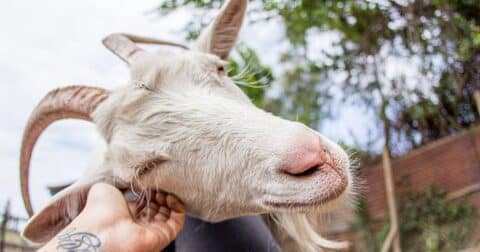Explainer
Are Organized Animal Rebellions Really a Thing?
Animal Behavior•6 min read
Explainer
In a world filled with factory farms, it’s a rare scenario, but one worth examining.


Words by Seth Millstein
Animals raised in factory farms live short, unpleasant and largely immobile lives. But put those same animals in a natural, spacious environment, and it’s a whole different ball game. Farm animals, it turns out, are actually complex, thinking creatures with rich inner lives, and a look at farm animals’ personalities when they’re free shows that in truth, they’re not as dissimilar from us as we might think.
We’re frequently socialized to think of animals as mindless, dumb, personality-free creatures who are unworthy of respect or dignity. People who don’t think for themselves are sometimes called “sheep,” boorish and impulsive people are called “pigs” and cowardly people are called “chickens.” When people are naively unaware of some danger that awaits them, we say that they’re “lambs to the slaughter.”
In science, too, the language used to describe animal behavior is often clinical and detached, even when that behavior is very similar to ours. Humans have emotions, but animals merely have “core affects.” It’s common practice for some scientific literature to refer to an animal as “it,” rather than “he” or “she.” And it took decades to acknowledge evidence of animal culture.
Whether intentional or not, all of this linguistic conditioning serves a very specific end: it helps to make people feel less guilty about eating animals, and less bothered by the way they’re treated in factory farms. After all, if farm animals are unthinking, vapid and possibly not-even-fully-conscious creatures, then it’s not so bad to imprison and eat them. Yet farm animals are much more similar to humans than this reductive language implies. Cows have social circles, and best friends within those social circles. Pigs goof around when there’s nothing else to do. And in every species, there’s a wide array of different personality types.
Cows are deeply social creatures. Outside of intensive farming, their socialization begins almost immediately, when their mother licks them for several hours after birth to solidify a bond with them. Shortly after that, young cows will meet the other members of their herd, and soon enough, they form social groups within the herd. Many cows will even find a “best friend” in their group; these friendships often last for years, and studies have shown that being around their best friend reduces a cow’s stress.
But what do cows actually do in these social groups? In addition to licking one another, which is believed to have a calming effect, they play. When given the space to do so, cows run around, chase each other, play-fight and bat around objects. Cows have been compared to dogs in terms of their playfulness, so it’s probably no surprise that in some cases, they’ll play with dogs as well.
One of the biggest determinants of a chicken’s health is how much space he or she is given, and when given enough space, they’ll certainly take advantage of it. Chickens love to forage, and spend much of their time pecking around in the grass or digging around in the dirt in search of food. When they’re not foraging, they’re often sunbathing, dustbathing, or both.
Like many young animals, chicks like to play. In addition to chasing one another around, they’ll often engage in “sparring” activities, which typically involve two chicks facing one another while one or both of them jump, flap their wings, or gently peck one another. Chicks are good at entertaining themselves on their own as well, and will often frolic, jump and spin around when left to their own devices.
Although adult chickens don’t play with one another to the same extent, they do tend to stay relatively close to each other — even when they have plenty of space to spread out.
“Sheep” is often used as a derogatory term for a person who lacks individuality and mindlessly follows others, but actual sheep aren’t like this at all. To begin with, sheep certainly see each other as individuals: they’re capable of recognizing and remembering up to 50 distinct sheep faces, and they can retain these memories for years.
Moreover, while they generally tend to be somewhat cautious by nature, different sheep have different personalities. Some are more timid, and won’t stray far from the flock, while others are bolder and will break away to graze in unfamiliar places. Some sheep are gregarious and social, while others are independent and non-conforming.
And unlike the type of person who might be referred to as a “sheep,” real sheep aren’t easily fooled. In one study, sheep were given a reward for completing a task, and then that reward was reduced. The sheep noticed, and became stressed at the prospect of getting less than, in their eyes, they deserved.
When pigs aren’t cooped up in gestation crates or farrowing cages, they play — with each other, with objects and on their own. Studies have shown that this play, in addition to being enjoyable for the pigs, is important to their cognitive development.
Pigs that know each other will often play-fight, or chase each other around.
Solo pigs like to shake and carry sticks around, push balls with their nose and toss around straw. Even if a pig has no objects or friends in their immediate vicinity, they’ll run around energetically, flop on the ground and root through the mud for fun, or to clean themselves.
In addition to being highly intelligent, several studies have demonstrated that pigs have different personality types; coping styles, temperaments, extraversion and even levels of optimism vary from pig to pig. What’s especially notable, though, is that some of these personality traits correlate with one another in a way that mirrors human psychology.
A 2016 study found that extroverted pigs tend to be more optimistic when placed in unfamiliar environments, while the more introverted pigs became pessimistic and withdrawn. Research has found that in humans, too, optimism and pessimism are correlated with extraversion and introversion, respectively.
Goats are yet another example of a highly social farm animal. They like to stick together when possible; it’s rare to find one who’s strayed too far from the group, and studies show that they become stressed out when they’re alone. Goats are able to recognize their friends by voice alone, and if they detect stress in their friend’s call, their own heart rate will become elevated.
Goats are also very curious creatures, and like to explore their surroundings for anything new. This is believed to be because they’re somewhat picky eaters, and have evolved to be skilled at seeking out the food they need in unfamiliar places.
Like chickens, cats and some other animals, goats like to be in elevated positions, which is what makes goat yoga possible.
Every year, tens of billions of animals languish in factory farms. They don’t get to play, explore, bond with their friends or care for their children. They don’t forage for food, or form social groups. In many cases, they spend most or all of their lives sitting, standing or lying in place.
But this isn’t because farm animals don’t like to engage in this sort of behavior. It’s because they aren’t given the opportunity to. When they are given that opportunity — that is, the opportunity to live their lives in the ways that they evolved to — evidence shows these very same animals flourish, and their personalities shine.